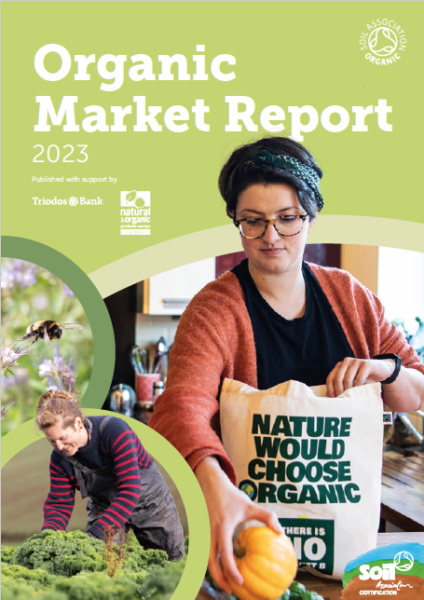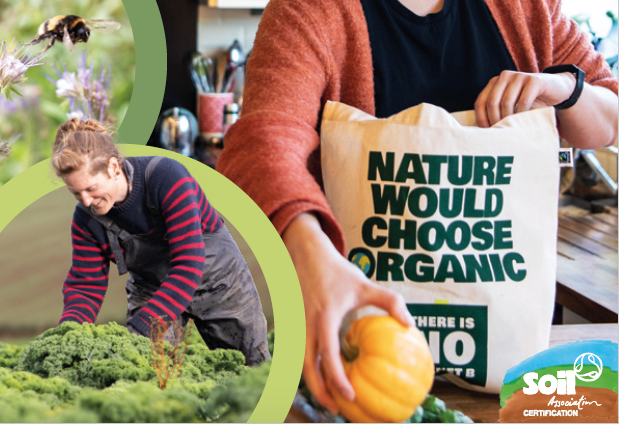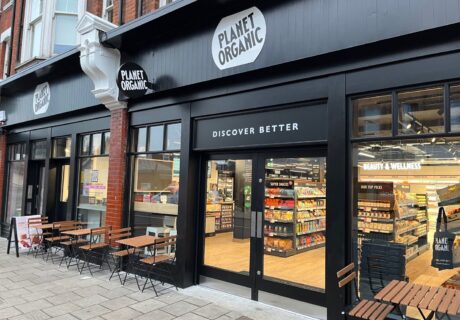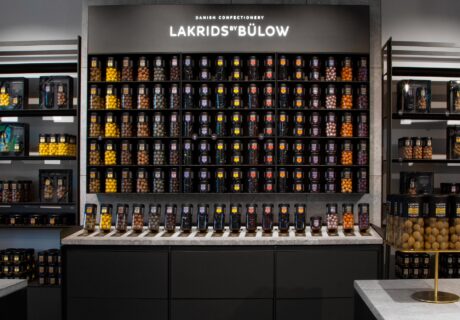Soil Association Certification’s Organic Market Report (OMR) 2023 has been published, showing ‘strong performance’ and featuring a new Sustainability Report which highlights how ‘fixing our broken food system demands a holistic approach from the roots up’.
The OMR – published with support from Triodos Bank and NOPEX – indicates ‘positive and robust growth’ of 1.6% in 2022, topping £3.1 billion against a backdrop of ‘unprecedented’ and ‘exceptionally challenging’ trading conditions.
 Key insights revealed in the report include: the organic food and drink market has achieved a 25.4% growth over three years; the sector is marking 11 years of consecutive growth despite Brexit, record inflation, cost of living barriers, rising energy prices and uncertainties around the ongoing Russian invasion of Ukraine; almost £8.5 million is spent on organic food and drink every day; fuelling the uplift of overall sales is organic foodservice which saw 152% growth last year; and non-food categories also saw sales increase – organic textiles by 35% and organic beauty by 6.8%.
Key insights revealed in the report include: the organic food and drink market has achieved a 25.4% growth over three years; the sector is marking 11 years of consecutive growth despite Brexit, record inflation, cost of living barriers, rising energy prices and uncertainties around the ongoing Russian invasion of Ukraine; almost £8.5 million is spent on organic food and drink every day; fuelling the uplift of overall sales is organic foodservice which saw 152% growth last year; and non-food categories also saw sales increase – organic textiles by 35% and organic beauty by 6.8%.
Alex Cullen, Soil Association Certification commercial director, comments: “With sales exceeding £3.1 billion we have seen a transformation in the organic food and drink market since the pandemic with a phenomenal 25.4% growth in just three years. Despite the economic turmoil and significant challenges everyone faced in 2022 the organic market delivered a strong and resilient performance growing a respectable 1.6%.
“In these challenging conditions organic foodservice delivered a stellar performance growing 152% and helping to drive this uplift while organic food and drink sales in supermarkets, independent retailers and home delivery had mixed fortunes with shoppers forced to make hard decisions on their weekly shop as they faced the cost of living crisis.
Inflation will come down and shopper confidence will return
“Today eight out of ten supermarket shoppers buy organic and many are cutting their spend or switching to conventional products because of price pressures. But crises don’t last forever. Inflation will come down and shopper confidence will return. In organic there is an amazing momentum building with the potential for strong future growth captalizing on the high levels of consumer trust and confidence it holds by meeting their needs for sustainable and healthy food. The more economies of scale we can build across the organic sector the more we can bring down prices and make high quality, healthy organic food accessible for all.”

Across retail and foodservice the OMR makes the following observations:
- Organic sales in supermarkets fell 2.7% during 2022 before enjoying a pre-Christmas boost, and the sector share of supermarket ‘remains sizeable’ at £1.92 billion
- Despite facing multiple cost of living pressures foodservice organic sales jumped to £195.5 million (from £78.2 million in 2021) largely driven by hot drinks and milk in leading café chains
- With mixed performances across different companies in home delivery, sales remained flat at £558.6 million; innovation, new technologies and the introduction of broader organic ranges were driven by the need to attract new customers post-COVID
- Independent retailers saw sales drop by 3.3% to £432.1 million in 2021. The challenge remains for smaller stores to retain new customers gained during the pandemic, and encourage higher, more frequent spend among their regulars. Over 60% of retailers cited inflation as the top challenge but two thirds believe sales will increase in 2023
- Global demand for certified organic cotton grew, leading to an organic textiles boom of 35%, while organic beauty and wellbeing products reached £147.6 million (up 6.8%)
- While organic farmers weren’t impacted by escalating fertilizer prices, they were not immune from the pressures of rising heating bills and rocketing feed costs. Overall, organic farmland grew by 3.6% to 507,000 hectares in 2021.

Sustainability Report
Containing contributions from partner NGOs ‘working at the heart of the sustainability space’, the OMR was delivered with a mini-Sustainability Report which highlights the importance of a holistic approach to ‘fixing our broken food system’.
The free report (available separately) features insights from WWF, the Fairtrade Foundation and the Forest Stewardship Council (FSC) which ‘share the same holistic view of how we should be caring for our land and changing food and farming systems, regarding tackling climate change through the choices we make at checkout’.
“As sustainable choices become more important to consumers and retailers, together with Government’s legally binding commitments on the environment, it is vital that we have greater clarity and consistency in decision making,” says Soil Association Certification. “And organic with its established standards has the potential to provide this clarity and proven credentials in delivering these healthy and sustainable choices.
The choices we make at the checkout can make a difference
The report argues that organic represents a ‘key solution’ to global governments searching for answers to environmental, nature and health crises. “As the Treasury looks for efficient investments to deliver on the Government’s Net Zero and nature commitments, organic offers an established choice which addresses many of the key priorities backed up by evidence and verifiable standards.”
Cullen adds: “The Soil Association works closely with leading NGOS to advocate for a better food and farming system to tackle the environment, nature and health crisis. This year we have worked with WWF, the Fairtrade Foundation and FSC to produce a new Sustainability Report providing their visions on how we tackle the climate crisis and how the choices we make at the checkout can make a difference.
“Organic is a good choice for governments, business and individuals because it is a ready-made solution for the climate crisis. Increasingly people are recognizing the crucial role that organic farming can play in restoring nature, replenishing soils and providing clean air and water as well as nourishing food.”





